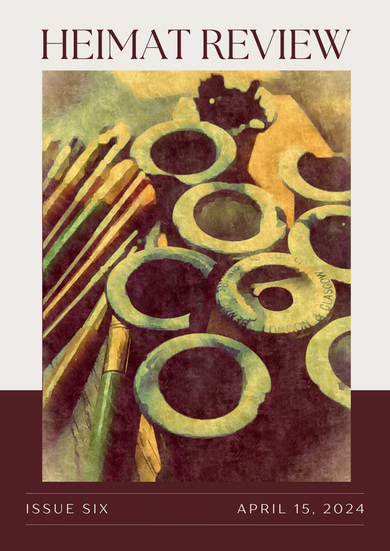DIY Derek
By Chris Cottom
April 15, 2024
April 15, 2024
Your father’s approach to DIY is to write a cheque. As a commercial traveller, he’s hardly at home.
‘Get a man in,’ he barks at your mother every time she frets over a blown fuse or dripping tap when he dials from a telephone box in Barnsley or Budleigh Salterton.
Sometimes the world of industrial pipework demands his weekends as well.
‘Your father is a rover,’ your mother says, as if he’s the swashbuckling Captain Dan Tempest from The Buccaneers on ITV, plundering treasure chests spilling with sparkling jewels.
On the eve of your nineth birthday he sets sail for uncharted lands, never to return.
‘That Sandra Bigelow is a trollop,’ your mother says.
She gets her hair cut short like Audrey Hepburn and buys a pair of sunglasses from Boots the Chemist in Shepperton High Street. You stay over at your gran’s one Saturday and when your mother collects you she’s wearing a full-skirted red dress with big white polka dots which reminds you of Minnie Mouse. At home there’s a man in his shirtsleeves clipping the hedge.
‘Come and meet Uncle Derek,’ your mother says.
He comes round the following weekend to replace the spindle in the twin-tub and lop the crab-apple tree which had been your father’s favourite.
Your mother chooses some trendy orange wallpaper for what is now her bedroom, and Uncle Derek whistles Sinatra songs while you paste and he papers. He sports a twirly moustache and sometimes in the sunshine you catch flecks of russet in his crinkly dark hair, like glimpsing gold in a forest.
He reckons everyone should know how to wire a plug, so he teaches you. He shows you how to measure and cut a piece of wood, mend a puncture and oil your chain. He re-strings your Pelham Pinocchio puppet and lends you his back copies of Practical Woodworking.
Uncle Derek invariably wears a Viyella shirt with grey serge trousers no longer presentable enough for his job at the Ministry of Aviation, where he works as something called a Clerical Officer. His Morris Traveller, an ash-framed estate car in battleship-grey, is an Aladdin’s cave from which he always pulls the right size of Whitworth bolt or length of two-by-two. Its once-red leather front seats are cracked with brown veins as delicate as lace. The back seats are permanently folded down to accommodate the clutter.
‘I reckon they haven’t seen a bottom this side of 1960,’ he says.
He tells you he knows a rabbit who’s not being looked after properly, and you help him build a hutch. The best bit is the sliding door into the bedroom.
‘Very good,’ you say, when Uncle Derek is finally happy it’s moving smoothly. ‘But how will the bunny slide it?’
The rabbit arrives in a cardboard box on the front seat of the Morris and is white with grey splodges so you call her Splodgy. Sometimes you bring her into the hall to slip-slide on the parquet floor and nibble jagged edges along the bottom of the heavy green curtains.
You never visit Uncle Derek’s house on the other side of Sunbury, where he lives with his wife, so you can only imagine his fabled tool-shed with its sawdusty floor and ranks of screwdrivers, its pincers and pliers, its coach bolts and six-inch nails, its tins of Danish oil and jam jars of everything.
When Uncle Derek gives you a ten-shilling note for your birthday, you walk down to Pedley’s, the ironmongers in the High Street, purveyors of everything from teapots to timber. You gaze at the gimlets and bradawls, the tenon saws and Stanley knives, the chisels and claw hammers, yearning for everything and unable to choose. Eventually Mr Pedley, in his long sand-coloured shopkeeper’s coat, shows you a new type of screwdriver called a Pozidriv. It has a blue handle and comes in a red plastic case with little compartments of its own special silver screws. It costs half a guinea.
‘All the sizes you’ll need to start off with,’ he says. ‘I’ll knock sixpence off, since you’re an enthusiast. Ten bob to you.’
Uncle Derek is helping your mother fix something in her bedroom when you get home. You show him your Pozidriv and quote the motto he’s taught you. ‘The right tool for the right job.’
‘Absolutely. Shall we build Splodgy a run so she can go on the lawn?’
‘Get a man in,’ he barks at your mother every time she frets over a blown fuse or dripping tap when he dials from a telephone box in Barnsley or Budleigh Salterton.
Sometimes the world of industrial pipework demands his weekends as well.
‘Your father is a rover,’ your mother says, as if he’s the swashbuckling Captain Dan Tempest from The Buccaneers on ITV, plundering treasure chests spilling with sparkling jewels.
On the eve of your nineth birthday he sets sail for uncharted lands, never to return.
‘That Sandra Bigelow is a trollop,’ your mother says.
She gets her hair cut short like Audrey Hepburn and buys a pair of sunglasses from Boots the Chemist in Shepperton High Street. You stay over at your gran’s one Saturday and when your mother collects you she’s wearing a full-skirted red dress with big white polka dots which reminds you of Minnie Mouse. At home there’s a man in his shirtsleeves clipping the hedge.
‘Come and meet Uncle Derek,’ your mother says.
He comes round the following weekend to replace the spindle in the twin-tub and lop the crab-apple tree which had been your father’s favourite.
Your mother chooses some trendy orange wallpaper for what is now her bedroom, and Uncle Derek whistles Sinatra songs while you paste and he papers. He sports a twirly moustache and sometimes in the sunshine you catch flecks of russet in his crinkly dark hair, like glimpsing gold in a forest.
He reckons everyone should know how to wire a plug, so he teaches you. He shows you how to measure and cut a piece of wood, mend a puncture and oil your chain. He re-strings your Pelham Pinocchio puppet and lends you his back copies of Practical Woodworking.
Uncle Derek invariably wears a Viyella shirt with grey serge trousers no longer presentable enough for his job at the Ministry of Aviation, where he works as something called a Clerical Officer. His Morris Traveller, an ash-framed estate car in battleship-grey, is an Aladdin’s cave from which he always pulls the right size of Whitworth bolt or length of two-by-two. Its once-red leather front seats are cracked with brown veins as delicate as lace. The back seats are permanently folded down to accommodate the clutter.
‘I reckon they haven’t seen a bottom this side of 1960,’ he says.
He tells you he knows a rabbit who’s not being looked after properly, and you help him build a hutch. The best bit is the sliding door into the bedroom.
‘Very good,’ you say, when Uncle Derek is finally happy it’s moving smoothly. ‘But how will the bunny slide it?’
The rabbit arrives in a cardboard box on the front seat of the Morris and is white with grey splodges so you call her Splodgy. Sometimes you bring her into the hall to slip-slide on the parquet floor and nibble jagged edges along the bottom of the heavy green curtains.
You never visit Uncle Derek’s house on the other side of Sunbury, where he lives with his wife, so you can only imagine his fabled tool-shed with its sawdusty floor and ranks of screwdrivers, its pincers and pliers, its coach bolts and six-inch nails, its tins of Danish oil and jam jars of everything.
When Uncle Derek gives you a ten-shilling note for your birthday, you walk down to Pedley’s, the ironmongers in the High Street, purveyors of everything from teapots to timber. You gaze at the gimlets and bradawls, the tenon saws and Stanley knives, the chisels and claw hammers, yearning for everything and unable to choose. Eventually Mr Pedley, in his long sand-coloured shopkeeper’s coat, shows you a new type of screwdriver called a Pozidriv. It has a blue handle and comes in a red plastic case with little compartments of its own special silver screws. It costs half a guinea.
‘All the sizes you’ll need to start off with,’ he says. ‘I’ll knock sixpence off, since you’re an enthusiast. Ten bob to you.’
Uncle Derek is helping your mother fix something in her bedroom when you get home. You show him your Pozidriv and quote the motto he’s taught you. ‘The right tool for the right job.’
‘Absolutely. Shall we build Splodgy a run so she can go on the lawn?’
~
Your mother thinks Splodgy needs a companion. But Squareface proves to be a boy rabbit with dishonourable intentions.
‘We’ll ask the pet shop to swap him for a guinea-pig,’ your mother says.
Instead you go to see Mr Pedley.
‘I’ve got an urgent project,’ you say.
Uncle Derek has been coming round less and less, but you know how to cross-cut, how to brace a right-angled joint, and how to make a pilot hole so the wood won’t split. You have tools of your own, always visiting Pedley’s with the one-pound note your father sends you at Christmas and birthdays. Your favourite book is the Reader's Digest Guide to Basic Woodworking which Uncle Derek has lent you. You’re ready to go solo.
The next evening in the garage, Squareface, temporarily accommodated in a tea chest, is watching his hutch take shape when your mother comes in.
‘I’ve left you a roast-beef sandwich for your supper. Isn’t it Thunderbirds tonight?’
You have your head in Squareface’s bedroom where the door isn’t sliding properly. ‘I’ve got to finish this. Where are you going?’
‘Uncle Derek and I need to have a talk.’
Her voice sounds funny, and when you stand up, her eyes look a bit red.
Squareface sleeps well in his new house, but you don’t. You lie awake thinking about Uncle Derek inspecting your handiwork when he next comes round.
‘We’ll ask the pet shop to swap him for a guinea-pig,’ your mother says.
Instead you go to see Mr Pedley.
‘I’ve got an urgent project,’ you say.
Uncle Derek has been coming round less and less, but you know how to cross-cut, how to brace a right-angled joint, and how to make a pilot hole so the wood won’t split. You have tools of your own, always visiting Pedley’s with the one-pound note your father sends you at Christmas and birthdays. Your favourite book is the Reader's Digest Guide to Basic Woodworking which Uncle Derek has lent you. You’re ready to go solo.
The next evening in the garage, Squareface, temporarily accommodated in a tea chest, is watching his hutch take shape when your mother comes in.
‘I’ve left you a roast-beef sandwich for your supper. Isn’t it Thunderbirds tonight?’
You have your head in Squareface’s bedroom where the door isn’t sliding properly. ‘I’ve got to finish this. Where are you going?’
‘Uncle Derek and I need to have a talk.’
Her voice sounds funny, and when you stand up, her eyes look a bit red.
Squareface sleeps well in his new house, but you don’t. You lie awake thinking about Uncle Derek inspecting your handiwork when he next comes round.
~
An earlier version of this story was previously published in Parracombe Prize 2022.
|
Chris Cottom is a vegan Christian cyclist who’s spent the better half of his life outside Macclesfield, UK. He’s packed Christmas hampers in a Harrods basement, sold airtime for Radio Luxembourg, and served a twelve-year stretch as an insurance copywriter. His winning entry in the 2023 Off the Rails 3 Minute Story Competition was read aloud to passengers on the Esk Valley Railway between Middlesbrough and Whitby. In the early 1970s he lived next door to JRR Tolkien.
|
Author's Note:
The real-life, moustachioed, serge-trousered, and crinkly-haired Uncle Derek was my mother’s admirer after my parents divorced when I was eleven (and perhaps before that as well). While I continued to enjoy a loved and happy relationship with my father, it was Uncle Derek (not his real name) who taught me ‘how to measure and cut a piece of wood, mend a puncture and oil [my] chain’.
In 1971, a runaway car came off the road, just missing my brother, breaking my leg, and killing our father. After three weeks in St Thomas’ Hospital, where my father had been a consultant pediatrician, it was Uncle Derek who came up to London to drive me home in his ash-framed Morris Traveller in battleship grey, the back of which was ‘an Aladdin’s cave from which he always pull[ed] the right size of Whitworth bolt or length of two-by-two.’
After my mother had told us she and my father were getting divorced, she found me sitting with my pet rabbits Scrunchie and Priscilla in their house. Much later, I came to understand that learning to look after pets was good practice for the responsibility of looking after children. By 1996 it was time to build a guinea-pig hutch, alas without the support of a friendly high-street ironmonger. When, eventually, I proudly demonstrated its sliding bedroom door to our five-year-old, he said, ‘Very good, Dad.’ Then he paused before adding, ‘But how will they slide it?’
After my mother died in 2017, I found a long-ago diary entry recording that she’d told Uncle Derek she’d decided not to marry him. I recall her going to visit him when he was well over eighty and asking her to assure him how much I’d learnt from him. I wish I’d taken the time to go and tell him myself. I expect that, even in old age, he’d have maintained a fine toolshed. I should like to have seen ‘its pincers and pliers, its coach bolts and six-inch nails, its tins of Danish oil and jam jars of everything’.
In 1971, a runaway car came off the road, just missing my brother, breaking my leg, and killing our father. After three weeks in St Thomas’ Hospital, where my father had been a consultant pediatrician, it was Uncle Derek who came up to London to drive me home in his ash-framed Morris Traveller in battleship grey, the back of which was ‘an Aladdin’s cave from which he always pull[ed] the right size of Whitworth bolt or length of two-by-two.’
After my mother had told us she and my father were getting divorced, she found me sitting with my pet rabbits Scrunchie and Priscilla in their house. Much later, I came to understand that learning to look after pets was good practice for the responsibility of looking after children. By 1996 it was time to build a guinea-pig hutch, alas without the support of a friendly high-street ironmonger. When, eventually, I proudly demonstrated its sliding bedroom door to our five-year-old, he said, ‘Very good, Dad.’ Then he paused before adding, ‘But how will they slide it?’
After my mother died in 2017, I found a long-ago diary entry recording that she’d told Uncle Derek she’d decided not to marry him. I recall her going to visit him when he was well over eighty and asking her to assure him how much I’d learnt from him. I wish I’d taken the time to go and tell him myself. I expect that, even in old age, he’d have maintained a fine toolshed. I should like to have seen ‘its pincers and pliers, its coach bolts and six-inch nails, its tins of Danish oil and jam jars of everything’.


